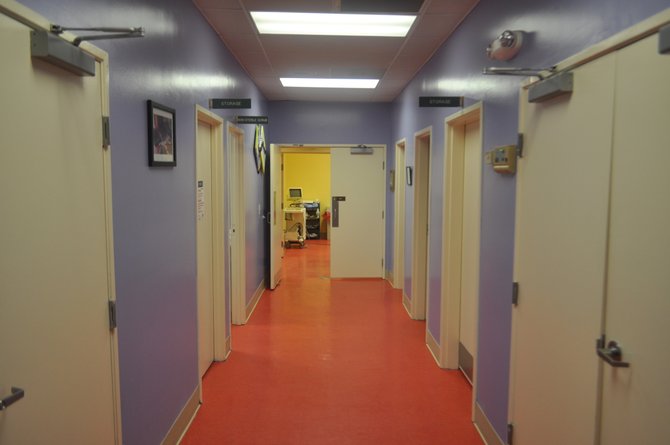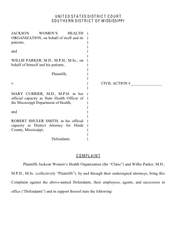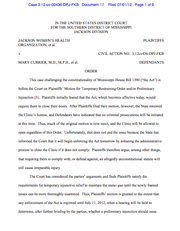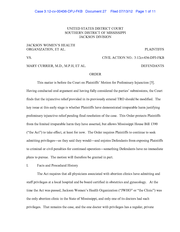Photo by Trip Burns.
Emily Lyons arrived at work early the morning of Jan. 30, 1998. A pretty woman with long, dark hair, Lyons, then 42, was the head nurse at the south Birmingham health clinic that opened at 8 a.m. The clinic's administrator, Michelle Farley, was feeling nauseous and running late.
Photo Gallery
Inside the Abortion Clinic
JFP photographer Trip Burns was given full access to the Women's Health Organization Clinic.
It was around 7:30 a.m. when Lyons went to say good morning to Robert Sanderson, an off-duty police officer who sometimes worked security at the clinic in addition to some of the local gay bars for extra money. Known to everyone as Sandy, he wasn't the clinic's regular guard. As he escorted Lyons to the building, she noticed an overturned flowerpot partially buried near the clinic's entrance.
Lyons would later recollect the fake plant "was not anything we would have ever had. So at that point, Sandy knew something was wrong."
Dead Silence
"Do you hear the sirens? They're coming for us. They've blown up the clinic."
Click. Dead silence.
Diane Derzis received the phone call at her home 600 miles away in Virginia, an hour after Sanderson leaned over to inspect the mysterious plant. She tried unsuccessfully to call the woman back. The caller was the Birmingham clinic's administrator, Farley. Unnerved by the message, Derzis turned on the television, and everything became clear.
A bomb packed with dynamite and 5.5 pounds of nails, locked in a toolbox and hidden under the plastic plant, exploded at 7:33 a.m. The blast killed Sanderson immediately and critically injured Lyons. Derzis caught the first flight she could out of Charlottesville an hour or two later.
During a layover in Charlotte, she stared weepy-eyed at television monitors carrying news of the bombing in the airport terminal when a man approached her and asked if she was the owner of the New Woman All Women Health Center.
Derzis answered in the affirmative. The man identified himself as an agent with the federal Bureau of Alcohol Tobacco and Firearms. The ATF agent was also headed to Birmingham—to investigate the bombing of the health clinic Derzis owns, one of two in the city that performs abortions.
A Valuable Prize
On a drizzly afternoon in July 2012, reporters at the federal courthouse in downtown Jackson encircled Derzis. She was dressed in her signature white with a linen jacket draped over her shoulders like a cape, a necklace of large amber-hued stones around her neck. Fifteen minutes earlier, Derzis' attorneys had argued to federal Judge Daniel P. Jordan to set aside a state law that put new restrictions, officially speaking, on ambulatory surgical facilities that perform abortions.
Known by capitol insiders by its official legislative designation that sounds like the name of an agent of biological warfare, HB 1390—or more simply, "1390"—makes it mandatory for doctors who perform abortions at freestanding clinics to have admitting privileges at a local hospital. Physicians who do fewer than 10 abortions per month in their private offices are exempt.
It took 44 days for the bill to slice through the state Legislature during the last session, from the day Republican Rep. Sam Mims introduced HB 1390 in late February to the day that crimson-clad members of Mississippi's pro-life movement flanked Gov. Phil Bryant at an official signing ceremony April 16. It was one of the first bills the first-term Republican governor signed into law. And given his co-chairmanship of last fall's failed Personhood initiative that coincided with the governor's own campaign, it was perhaps a crowning achievement for conservatives in the state.
But, in reality, any additional restriction heaped onto abortion clinics, no matter how minute or innocuous, would apply to only one building in Mississippi: the Jackson Women's Health Organization off State Street in the heart of Fondren, the state's sole remaining abortion clinic.
Other than her anti-abortion opponents, her friends and reproductive-rights activists, the 58-year-old Derzis is relatively unknown to Mississippians. Even the roughly 2,000 women per year who get abortions at JWHO each year likely don't know who she is.
Despite her aura of mystique, Derzis is neither quiet nor shy. In fact, she exudes every iota of toughness one would expect out of a woman of someone who's spent three decades advocating for abortion rights in the South. Nor is she as circumspect about having been party to over 50,000 abortions in her career as a clinic director and owner. In addition to JWHO, she owns facilities in Columbus, Ga., Richmond, Va., and Birmingham.
Derzis is loud, flamboyant and can be brash, making her a perfect target for the forces that wish to end the practice of abortion in America. In that battle, Mississippi represents a beachhead.
With Jordan, a George W. Bush appointee, ruling that the provisions of 1390 could go into effect and ordering Derzis' Jackson clinic to continue trying to comply with the admitting privileges law, the real possibility now exists that Mississippi could become the nation's first state without a single abortion clinic.
Based on experience, Derzis knows that the Jackson clinic is considered a valuable prize, one that abortion's enemies will stop at nothing to capture.
Safe, But Disrespected
Derzis was born and grew up in Elkton, Va., a town in the Shenandoah Valley nestled in the shadows of the Blue Ridge Mountains. When she was in high school, a scandal rocked the tiny town when police arrested a local doctor for performing abortions for young women who traveled from the other side of the mountain from Charlottesville, home of the University of Virginia. This was before abortion was legal. Derzis remembers stories about fetal skeletons excavated from the doctor's yard. At the time, she didn't understand what the word abortion meant. This, despite the fact that her mother, Lois Workman, was a feminist before anyone knew what a feminist was, much less the folks in Rockingham County, Va.
Diane's mother played college basketball and told her daughters to learn how to type; at that time it was a skill that would always guarantee women employment.
In 1973, Diane enrolled in college 18 miles from home at James Madison University. There, she met Nick Derzis, a vacuum-cleaner salesman whose family owned restaurants in Alabama. The couple married and moved to Birmingham. Diane Derzis enrolled in classes, this time at the University of Montevallo in Alabama. Originally founded as a technical college for girls in 1896, it eventually became a state women's college and is now coed, although its student body remains overwhelmingly female.
A year after the Derzises married, she became pregnant. "It was just no question for me that that was a parasite," Derzis said about the pregnancy. "I did not want to be pregnant. I was in college at that time. I was also waitressing, and we were young, and it was just not an option."
Abortion was legal, but abortion clinics didn't exist, yet. She and her husband found a Birmingham doctor who would was willing to perform the procedure for $150. The people in the waiting room the day she had her procedure represented a cross-section of society, but one couple especially looked out of place. "They must have been in their 50s or 60s. He had on overalls, and she had on a dress with those pantyhose that stopped at the knees. They were very working class; they looked like farmers," Derzis recalls.
When it was her turn to see the doctor, he told her, "You didn't have any problem spreading your legs before, so spread them now." The procedure was over in five minutes. She had mixed feelings about what she'd gone through. She was grateful that the procedure was safe, but felt disrespected.
Clinics slowly began sprouting up all over the country, including in the South. When Dr. Ralph Levinson, originally of Cumberland County, Ky., started Birmingham Women's Health Clinic, Derzis begged him to hire her as a counselor for $5 an hour.
She spent five years working there when Bob Lipton, who owned several abortion clinics on the east coast and was starting a second one in Birmingham, invited Derzis, then 23, to run it. Between the clinics, Derzis sold Mercedes-Benzes. A Mercedes owner herself, she was a natural and broke sales records.
"I had a Mercedes so I knew how they drove," Derzis explains. "Again, it's something you believe in; you're lucky if you find something you believe in ... but that was really not my calling."
'Abortion Queen'
In 1969, 21-year-old Louisiana resident Norma McCorvey tried to get an abortion in Dallas. Texas did permit women to terminate their pregnancies back then, but only if they were raped or victims of incest. With no legal way to terminate the pregnancy, McCorvey carried the child to term and gave it up for adoption after she gave birth.
McCorvey is better known by the pseudonym under which she fought Texas' abortion restrictions all the way to the U.S. Supreme Court: Jane Roe.
Even though 1973's Roe vs. Wade nullified individual state laws that prohibited abortion, the landmark ruling did not stop state legislatures from trying to end abortion. In addition to directing the Summit Medical Clinic in the early 1980s, Derzis went to Montgomery to lobby for pro-choice issues and fight back attempts to roll back federal abortion protections in Alabama, including attempts to redefine when life begins and proposals to implement parental and, in some cases, spousal consent rules.
That's when she earned her nickname: the Abortion Queen.
"I embraced it. I don't feel any shame about what I do. It's not shame that's associated with what I do. It's pride of how many women I've been able to help, how many women I've seen where abortions made a difference in their lives," she said.
In 1996, she announced that she was leaving the clinic she estimates performed 45,000 abortions during her tenure—16.5 times as many people currently live in her tiny Virginia hometown.
"The anti-choice people would think of 45,000 babies. What I think of is 45,000 women. That's the black and white. Right there is the answer why there can be no compromise on this issue," she said.
She accepted that the "antis," as she calls people who consider themselves pro-life, would chalk up her retirement in May 1996 as a victory, but she said she needed some serenity. A month and half later, the owner of Birmingham Women's Health, the clinic where she where she got her start as a teenaged counselor, sold the clinic to Derzis. By the time the clinic began operating under Derzis' ownership, the Summer Olympics were just getting under way in Atlanta.
The Army of God
Less than two years after she took over the Birmingham clinic, Derzis found herself on a plane talking to a federal law-enforcement officer about whether she had been worried about any of the protesters who were mainstays outside her clinic. It's located just a 30-minute walk from the 16th Street Baptist Church where, in 1963, a bomb planted by racist extremists killed four young girls.
No one protester in particular came to mind as a possible culprit; any one of them could be capable of violence, she told the ATF agent. Witnesses to the bombing told investigators that while other people rushed toward the clinic, a man in a brown wig, strangely, darted away from the scene and hopped into a gray Nissan pickup truck.
Investigators said they wanted to talk to Eric Rudolph, a North Carolina resident who people considered a loner, because he might have information about the attack. Indeed, Rudolph knew a lot about bombs- he'd set off four of them, including one that exploded at Centennial Park and killed 44-year-old Alice Hawthorne at the 1996 Olympics, the last time the U.S. hosted the Summer Games.
Two hours after Derzis' clinic was bombed, a Rudolph-affiliated group that called itself The Army of God sent letters to two Atlanta-area print-media outlets claiming responsibility for the attack. It vowed more violence against abortion clinics and, according to Rudolph's federal plea bargain, "anyone associated with the drug RU-486."
On the day of the bombing, the area around the clinic was cordoned off, making it impossible for Derzis to get close. Instead she went to directly to the hospital to see Lyons, who would eventually lose sight in one of her eyes. The only images Derzis saw of her clinic came from the television-news satellite feeds. The exterior walls of the white-brick structure were scorched, its windows obliterated. The burgundy awnings hung off the front of the building, shredded and tattered like a battle-worn flag. The device exploded with such ferocity that forensic investigators found projectiles in the procedure room, located upstairs in the rear of the building.
Five years later, a police officer in Murphy, N.C., believed a burglary might be in progress when he noticed a man rummaging through the garbage behind a business. The officer arrested the suspect, who turned out to be Rudolph. He is serving four life sentences at a federal prison in Colorado alongside other convicted high-profile convicts, including 9-11 planner Zacarias Moussaoui, Oklahoma City bomber Terry Nichols, underwear bomber Umar Abdulmatallub, shoe bomber Richard Reid, white supremacist Matthew Hale and other terrorists.
Even though the clinic closed for repairs after the bombing, the phones still worked and patients were calling wanting appointments. Receptionists warned callers about the large number of television media still camped outside. The day the remodeled clinic reopened, the protesters also returned. Derzis didn't lose any staff, but she heard rumors of doctors at other clinics calling it quits after the bombing.
In fact, violence against abortion providers had become commonplace. Since 1978, when an Ohio clinic became the site of the nation's first clinic bombing, more than 30 bomb attacks and around 200 arsons have occurred at U.S. abortion clinics, according to the National Abortion Federation. This total included the bombing of the Ladies Center and OB/GYN offices in Pensacola, Fla., on Christmas Day 1984. In the 1990s, attacks on property waned as abortion foes shifted their focus from the demand side of the equation and focused their attention on who they perceived to be the abortion suppliers—doctors and nurses, their associates and, in some cases, their families and children.
In March 1993, an abortion doctor named George Tiller was shot in both arms in Kansas. Also in 1993, David Gunn, an Alabama resident and friend of Derzis' was also shot to death in Pensacola. Gunn's was the first assassination of an abortion provider in the country. In 2004, Dr. John Britton, an abortion doctor who attended medical school at the University of Virginia, and his assistant, James Barnett, were murdered outside the Ladies Center, the same Pensacola clinic bombed in 1984 (it was also firebombed in 2012, but it remains open). In 2009, Tiller was murdered in Wichita.
Nancy Kohsin-Kintigh worked for the Feminist Majority Foundation in the early 90s, a time when she said abortion clinics were under siege by pro-life groups. In response to the lack of police action against flash-mob-style demonstrations organized by anti-abortion groups such as Operation Rescue and Operation Save America that involved hundreds of protesters illegally blocking access to clinics, Kohsin-Kintigh's organized clandestine rendezvous to shuttle women to clinics.
In the lexicon of military operations, Kohsin-Kintigh was the pro-choice Special Forces. Figuratively speaking, she parachuted in ahead of massive anti-abortion protests with apocalyptic-sounding code names like "Storming the Gates of Hell" to train clinic defenders.
"You become accustomed to being threatened, harassed and yelled at that some point, it becomes part of your daily routine," Kohsin-Kintigh said, who now does social-justice advocacy around several issues in Jackson.
Ironically, Kohsin-Kintigh was attending a pro-choice conference in Chicago when she received the news that Michael Griffin had executed Dr. Gunn in Pensacola. Afterward, there was a heightened sense of danger at clinics around the country, she said. Kohsin-Kintigh, who eventually established a base in Pensacola, and the Feminist Majority Foundation, enlisted the expertise of international security experts to perform risk assessments and conduct security trainings with clinic personnel. A law enforcement organization donated bulletproof vests and helmets for doctors. Some clinics installed bulletproof glass, metal detectors and magnetic locks.
In the aftermath of the New Woman All Woman Birmingham attack, Kohsin-Kintigh helped procure replacement glass for the shattered windows and new secure locks for the doors.
"Extremists have dominated the language by using the term pro-life and using the Bible as a prop. So at first glance you'd think they were peaceful and prayerful people, but some ugly things were coming out of their mouths, including threats," she said.
'You're not Christian'
In 2010, Derzis' friend Susan Hill, who founded the Jackson Womens Health Organization, died of cancer. Mississippi has some of the nation's toughest abortion laws, including mandatory counseling and a 24-hour waiting period. Jackson's other abortion clinic on Briarwood Drive closed in 2004.
"There's no way I'm doing Jackson," Derzis told people who believed she should take over Hill's clinic. "I knew what she had been through there."
But out of a sense of duty to Hill, Derzis agreed to visit JWHO and fell in love with the clinic, its staff and the city of Jackson.
"I feel good when I come over there, and I meet those women that come from all over and make great efforts just to exercise something that should be very easy to do, but it's not," she said.
Michelle Colon, a feminist and reproductive-rights organizer in Jackson, met Derzis in 2007. Colon, 37, calls Derzis an "anomaly" among abortion providers because, unlike many clinic owners, Derzis welcomes pro-choice activism.
Colon, who came to Jackson from Chicago to attend Jackson State University in 1997, has at times been discouraged by Mississippians' almost religious devotion to avoid talking about reproductive health at all, including abortion. That is problematic in a state with the highest rates of teen births and infant mortality in the nation, as well as disproportionately high sexually transmitted infection rates.
"It's like if you're pro-choice, you're not Christian," Colon said.
Still, pro-choice advocates have had victories worth celebrating, such as last year's defeat of the Personhood Initiative, a proposed constitutional amendment to redefine life as beginning at conception, fertilization or the functional equivalent thereof.
"The whole world has the image of Mississippi that (because) it's in the Bible Belt there are no progressives here, and it's just not true," she said.
A Surprising Defeat
Last fall, opponents of the Personhood Initiative staged a late-morning demonstration on the steps of the Mississippi Capitol. It was early November, days before the statewide election. At the time, it was too close to tell whether Initiative 26—the Personhood Initiative—would be successful this time around. Personhood had already been defeated in other states, but in reliably conservative Mississippi, the purveyors of Personhood saw their best prospects for success.
There was a special guest on the program whose identity remained withheld until it was her time to deliver the keynote pep speech.
Derzis wore a flowing white tunic, pendant necklace and a pink visor. The Personhood effort, which would have altered the definition of a human being to begin when sperm meets egg, would have functionally outlawed abortion in Mississippi and, by extension, put Derzis out of business in Jackson. It may also have forced women to travel to other states to get abortions.
Derzis said at the rally the push had been "engineered by do-gooding politicians, born-agains and outsiders—evil people who care more about the rights of a fertilized egg than the vessel containing it," she said.
And regardless of what happened on Election Day, Derzis vowed that the women of Mississippi would have access to abortions even if she had to hire limos and private planes to shuttle them out of state.
It never came to that. Sixty-eight percent of the state's voters rejected the initiative.
Following Personhood's surprising defeat, the conventional wisdom was that a conservative lawmaker would introduce a similar bill for consideration in the 2012 legislative session. After all, the new governor, Phil Bryant, had co-chaired the Personhood Initiative campaign, and the departing governor, Haley Barbour, made waves just before the election by saying the issue was best left up to the state Legislature, which Republicans controlled as of the last session.
There was no personhood bill but two other anti-abortion bills did survive. One controversial measure required doctors to check for a fetal heartbeat, which would have required an invasive procedure called a transvaginal ultrasound in the early weeks of a pregnancy. The other was HB 1390, the admitting-privileges bill. During the debate in the House, Mims, who sponsored 1390, acknowledged that, if passed, the law would apply only to Jackson Women's Health, Derzis' clinic.
When pressed by the bill's Democratic opponents, Mims said he believes life starts at conception and that the bill "makes it a little step harder" to have an abortion, which, he argued, could save a life. However, the Democratic women of Hinds County's delegation were not interested in making things easy for Mims. Rep. Alyce Clarke, D-Jackson, requested that only individuals capable of having an abortion be allowed to vote on the bill.
Rep. Adrienne Wooten, D-Ridgeland, noted that women with the option to terminate an unwanted pregnancy were less likely to end up on state welfare rolls.
Rep. David Baria, a Democrat from Bay St. Louis, took a shot at Barbour, who stirred a maelstrom of controversy by granting more than 200 pardons before he left office. If HB 1390 passed, Baria asked, "What options are there for a woman who gets raped by one of these convicts Gov. Barbour just turned loose?"
A bizarre set of circumstances followed in the Senate. Tate Reeves, the new lieutenant governor and a rising star in the state's GOP, assigned HB 1390 to the Public Health and Welfare Committee, chaired by Dean Kirby, R-Pearl. Reeves placed other conservative showpieces—the heartbeat bill and a tough immigration reform bill—in the hands of Amory Democrat Hob Bryan, chairman of the Judiciary B Committee.
At the April 3 Judiciary B meeting, Bryan did as expected and declined to bring either the ultrasound or the immigration bills up for a vote. Bryan questioned the bills' constitutionality and believed that the state would immediately face a lawsuit if it passed.
When Jud B adjourned, the Public Health Committee met one floor down to consider HB 1390. Brown, the chairman, moved that the bill move onto the full Senate; the motion was seconded. Democrats on the committee didn't make a peep, prompting groans from pro-choice activists—including Kohsin-Kintigh and Colon—and then-director of the Mississippi ACLU Nsombi Lambright.
Outside the committee room, Lambright buttonholed Sen. Kenny Wayne Jones, a Democrat from Canton with the physique of an NFL tight end, on why he and other Democrats didn't raise any objections.
Jones promised they would fight it on the floor.
On April 16, Gov. Bryant signed HB 1390 into law. It would take effect on the first day of the new fiscal year, July 1.
Falling Apart
While facing the prospect of losing the Jackson clinic, Derzis' Birmingham clinic received an enormous blow. In May, Alabama state health officials forced New Woman All Women to close over regulatory violations. As Derzis explains it, the clinic's Atlanta-based medical director, who also performed abortions, quit shortly after the first of the year, and Derzis replaced him with two doctors from out of state.
Under Alabama law, the medical director is required to observe doctors performing abortions. "Well, clearly, I wasn't even thinking about that at the time," Derzis said.
Then, on Jan. 21, Derzis said a new nurse overdosed two patients who had to be rushed to the hospital. Later that afternoon, a reporter called about reports of an ambulance in front of the clinic. "When the hell did you start calling about ambulances in front of clinics or doctors offices?" She snapped. By nightfall, the reporter broke a story with headlines referring to botched abortions at Derzis' clinic.
After a three-month-long probe into the incident, Derzis said the state health department made 5,800 copies of documents on the clinic's copier and, ultimately, issued 76 pages worth of deficiencies.
"The way they wrote it up made it sound like I picked up two guys off the street: My doctors didn't write legibly, my doctors didn't initial things. I'm telling you, it was a witch hunt," Derzis said.
The health department's order revoking the clinic's license allows for a new operator to take over, so Derzis arranged to lease the business to an associate, Kelley Rain-Water.
The state rejected Rain-Water's application because of her ties to Derzis, who said they'll pursue the matter in circuit court if the state rejects Rain-Water's appeal. What infuriated Derzis most was the fact that anti-choice protesters distributed photographs of the two sick women and the emergency medical technicians who transported them to the hospital.
Terri Herring, a Mississippi pro-life lobbyist, supported the passage of the admitting privileges law. She believes the troubles at Derzis' Alabama clinic portend similar problems in Jackson. "She keeps saying no one has been injured in her clinic in Mississippi. She has only been open a short time here, so are we going to wait for injuries to put them into compliance?" Herring wrote in an emailed statement to the Jackson Free Press. She declined an interview for this story.
Herring said the black plastic tarp draped around the clinic perimeter is evidence that JWHO is a "back alley clinic" and a "house of horrors." JWHO administrator Shannon Brewer explained that Derzis put up the plastic sheeting to protect patient privacy and prevent protestors from reaching through the iron fence to distribute literature to patients.
Upon entering the clinic, visitors encounter a sign on the front door that reads: "No bags, purses or children allowed in this facility." Natural light fills the waiting area, which is furnished with dark red leather sofas and chairs. Copies of O Magazine, Essence, Glamour, Cigar Aficionado and tall, ceramic bowls filled with condoms adorn the coffee tables. After assuming ownership of the clinic, Derzis ordered extensive remodeling, covering up the beige walls with soft yellow and lavender paint.
Before Derzis took over, Brewer wasn't involved with the politics—Dr. Hill and her attorneys handled that—but Derzis inspired her to increase her activism around reproductive rights. A Jackson resident, Brewer started at the clinic part-time in 2001 while she studied business management at Virginia College, but says the clinic has afforded her different kind of education. Brewer prefers to not to engage directly with news media, but maintains extensive knowledge of health department regulations pertaining to abortion clinics, security and wrangling protestors.
Case in point: A copy of the federal restraining order against anti-abortion activist Roy McMillan sits on Brewer's desk.
In 1995, a federal court ordered McMillan to stay 50 feet away from the clinic for violating the Freedom of Access to Clinic Entrances Act, enacted in 1994 after Dr. Gunn's murder in Pensacola. According to court records, on May 3, 1995, McMillan made his hand into the shape of a gun and told clinic employees: "Y'all look like a bunch of birds on a telephone wire waiting to be shot off by a man with a shotgun...Pow, pow, pow, pow."
McMillan pickets the clinic each day they see patients by displaying signs that carry pictures of fetuses and messages equating abortion to genocide. He and his wife, Beverly, an OB/GYN and former abortion doctor, also oppose all hormonal birth control including the pill and the morning-after pill.
Brewer said the biggest scare they've had involved a large dark-colored duffel bag left at the clinic's back door in 2009. Police evacuated the area, and the bomb squad blew it up; later, Brewer said, they found that the bag belonged to a homeless man who didn't want to carry it across town to a doctor's appointment.
Derzis calls McMillan a "loose cannon" but isn't sure if he's violent.
After all, she notes, Eric Rudolph was not a regular protester at the Birmingham clinic. Derzis, who carries a .25-caliber pistol and several Tasers, maintains surprisingly good humored about the threats she and her staff face.
"There's really not any reason right now for them to kill anybody—because they're winning," she said, with a deep laugh.
She's referring to states' recent successes in making life difficult for abortion clinics through regulations instead of outlawing the practice, which the courts have ruled is unconstitutional. Twenty states have passed laws requiring tighter regulations on abortion facilities and doctors.
A similar law to HB 1390 passed in Indiana last year, and Tennessee lawmakers are considering a bill that would require physicians who perform abortions to have hospital privileges in either the home or adjacent county of the woman seeking an abortion.
The experience of other states that passed abortion regulations demonstrate how costly the fights can be. Kansas spent $400,000 over a six-month period in 2011 defending abortion restrictions; more than half that sum went to pay private attorneys. Two anti-abortion laws in South Dakota over a 10-year period resulted in $623,000 in payments to Planned Parenthood, the plaintiff in both cases. South Dakota also passed a law requiring a three-day waiting period for an abortion in March 2011, which triggered a lawsuit that the state's Legislative Research Council estimated could cost as much as $4 million to fight.
Word on whether any of the seven applications JWHO has made to area hospitals is expected any day now, but no matter what happens with the applications, neither side is likely to give up its battle. For Brewer, she said it's inconceivable that the clinic would ever close and that she doesn't think much about the possibility that JWHO will meet the same fate as Derzis' Birmingham facility.
"I know Diane will be fighting to the last day," Brewer said. "She is not one to give up. As long as she doesn't, I'm going to be there beside her."
Comment and view a gallery from inside the clinic at jfp.ms/clinic. Email R.L. Nave at rlnave@jacksonfreepress.com.
CORRECTION, 8/2/2012 -- This story is updated to reflect a correction. An earlier version incorrectly stated that RU-486 is also known as the morning-after pill. The Jackson Free Press regrets the error.









Comments